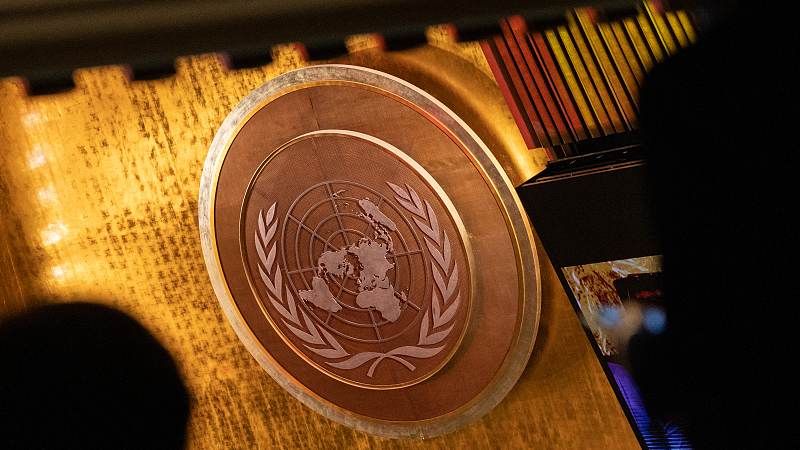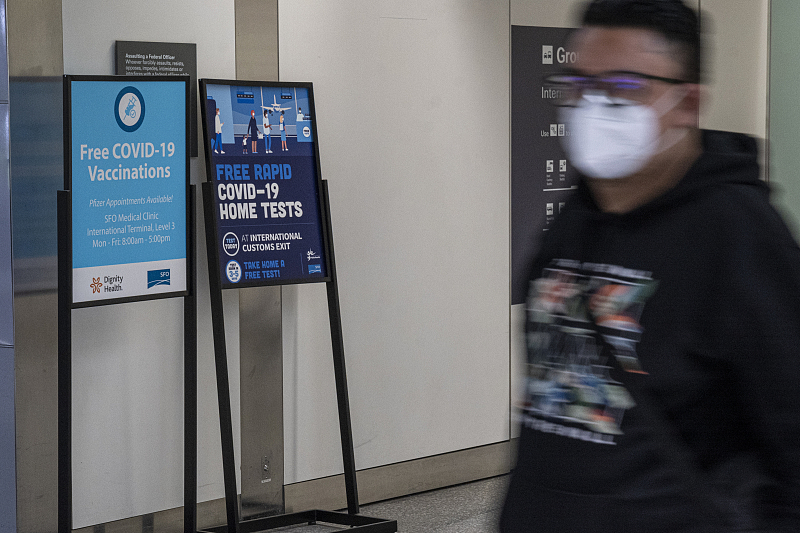
The United Nations (UN) seal at the headquarters in New York, U.S., September 19, 2022. /CFP
The United Nations (UN) seal at the headquarters in New York, U.S., September 19, 2022. /CFP
Editor's note: Stephen Ndegwa a PhD student in International Relations at the United States International University-Africa, and the Executive Director of South-South Dialogues, a Nairobi-based communication development think tank. The article reflects the author's opinions and not necessarily those of CGTN.
World leaders are likely taking the next available plane from the United Kingdom to New York after the funeral of Queen Elizabeth II. They are expected to attend the General Debate of the 77th session of the United Nations General Assembly (UNGA 77), which has already begun in earnest. Nonetheless, the somber occasions require deeper reflections on the past and about the future.
The world stands on tenterhooks with increasing social and economic burdens. The achievement of the 17 Sustainable Development Goals remains in abeyance because of the existing ideological chasms between the developed and developing world. Countries have been working at cross purposes, with one side protecting its privileged position in the status quo, and the other fighting to emerge from the doldrums of underdevelopment, respectively.
The global meeting comes as a report released by the Lancet COVID-19 Commission medical journal on September 14 indicted world leaders for "massive failures" in their global response to the pandemic. The 45-page report blames the spread of the coronavirus on health authorities worldwide who shirked their respective responsibilities and took belated actions only when the pandemic had spiraled out of control.
But Lancet should have noted that there are countries that really helped others to fight the pandemic through the sharing of knowledge, morale and material support. The U.S. has acquired the dubious distinction of having the highest number of deaths from the pandemic, notwithstanding being one of the most developed countries in the world.

Signs for COVID-19 tests and vaccinations inside the arrivals hall at San Francisco International Airport (SFO) in San Francisco, California, U.S., June 13, 2022. /CFP
Signs for COVID-19 tests and vaccinations inside the arrivals hall at San Francisco International Airport (SFO) in San Francisco, California, U.S., June 13, 2022. /CFP
The Lancet report could as well have copy-pasted the reasons behind the inordinately high U.S. death toll and other pandemic-related crises in their report on global lethargy in fighting COVID-19. The best the West could do is to mock China's dynamic zero-COVID strategy, which saved millions of lives. This cynicism made the world lose out on crucial lessons that would have blunted the impact of the coronavirus.
With such permeating gloom from the social and economic ramifications of COVID-19, things can only get worse before they get better. Right now many countries are going through an economic recession exacerbated by much higher oil and food prices on account of the months-long Russia-Ukraine war.
The world is confronting yet another catastrophe of monumental proportions. Climate change has become a scourge with countries and regions experiencing extreme weather. In the last year, floods have killed thousands of people, with Pakistan becoming the latest victim with a third of the country submerged under water. The floods have led to the displacement of over 33 million people and 1,200 deaths.
Prolonged droughts have also devastated many countries aggravating the delicate food security in developing countries. According to the U.S. government's Humanitarian Information Unit, the Horn of Africa is experiencing its worst drought in more than 40 years with over 18 million people facing severe hunger in Ethiopia, Somalia and parts of Kenya. The UN says the drought affects Africa more than any other continent, accounting for an estimated 44 percent of the global total.
While these problems have been in existence in the past, it is the regularity that has become a worrisome phenomenon. Governments have to spend more money that were budgeted for other reasons in order to deal with disaster mitigation, thus slowing down the pace of development. Accordingly, poor countries are suffering the most with the dwindling of foreign aid from equally challenged sources.
The vulnerable regions are going to UNGA 77 to hear whether the UN's powerful members such as the U.S. and the European Union under the aegis of the Group of 7 (G7) could marshal resources to bail them out of their perennial humanitarian dire straits in the way they have come to the aid of Ukraine. This desire captures the meeting's theme, "A watershed moment: transformative solutions to interlocking challenges."
It could be a tall order since most of the poor countries hold little strategic value in aiding the West's hegemony. There has not been any foreseeable change of heart in the G7 to create a semblance of equity within the members of the global community through a comity of nations. Countries like China and Russia, which have upset the status quo, have been met by wrath.
The world has no choice but to unite before the problems could become overwhelming. The East and West divide is no longer tenable in a world bedeviled by insurmountable challenges that have no borders. It's time for the UN to rise to the occasion by rediscovering its mandate to take actions without fear or favor.
(If you want to contribute and have specific expertise, please contact us at opinions@cgtn.com. Follow @thouse_opinions on Twitter to discover the latest commentaries in the CGTN Opinion Section.)

